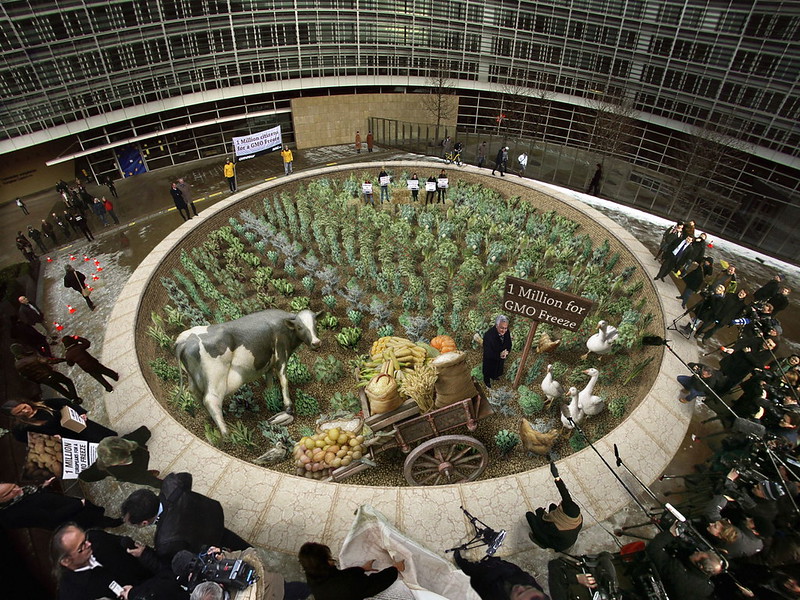The UK’s new plans for genetically engineered food: how worried should we be?
With change afoot in the EU, too, the key question is ensuring new technology supports the public interest.

After a consultation last year, the UK has moved away from some EU regulations on using genetic technology in food production. For the moment, this will just mean more scientific trials, but it could foreshadow bigger changes.
Genetic technology has long faced stiff resistance across Europe – and opposition to it can be found all over the political spectrum, with no obvious left / right distinction at play in the on-going argument.
Here we review some of the issues.
The EU status quo: not banned, but heavily restricted
As in all policy areas, the UK starts from a position of alignment with EU rules.
Although many people believe that the EU bans genetically modified food, this is not actually the case. But its regulations have traditionally been much stricter than the US, where corporations dominate the agricultural sector and have long made extensive use of genome technology. Only one “genetically modified organism” (GMO) has had regulatory approval by the EU to enter the food production system, Monsanto’s 810 maize seed.
The Amflora potato previously had permission to be grown for non-food related, industrial purposes (such as paper production). But, after sparking considerable controversy, was withdrawn from the European market in 2012 and subject to a negative European General Court decision in 2013.
What’s more, a number of member-states chose to opt-out of the Monstanto decision, persisting with their bans on GMO food. Spain and Portugal have been the big users of it to date, accounting for some 102,367 hectares in 2020.
Gene-editing versus GMO?
Genetic modification is not, however, the only way that genome technology can be utilised.
Whereas GMOs are defined by the introduction of genes from one organism into another, gene-editing involves a different technique. It manipulates the genes that naturally occur in the organism, rather than “adding in” entirely new ones found in another organism.
A controversial European Court of Justice decision in 2018 found that gene-editing technology should be subject to the same regulations as GMO. This caused considerable debate in the EU. The European Commission published a report in April 2021 calling for a rethink. But rules changes are thought to face stiff opposition in the European Parliament.
Still, many believe that this might turn out to be a very unusual Brexit policy area, in which the UK’s shift in policy approach will actually nudge the EU to follow on behind, rather than lead to substantive divergence.
What rules has the UK changed?
Under the new UK system, gene-editing is not subject to the same controls and restrictions as GMO. This will open up new avenues for scientific research and has been welcomed by many biotechnologists. They argue that the new regulations are appropriate, evidence-based and could lead to exciting new scientific breakthroughs.
At the moment, the policy is limited to gene-editing, though the government has not ruled out liberalising rules on GMO, too. As gene-editing is still a relatively new technology, there are not many agricultural products on the market that have used this technology. Sicilian Rouge High GABA, a type of tomato edited to contain more amino acids, produced in Japan is one of the few commercially available products. Other trials in the UK include broccoli engineered to have high levels of nutrition and a mustard relative designed to produce an olive oil-like substance.
The UK government have been open that they hope to gain a competitive advantage over the EU in this new area.
Should we be worried?
This is a controversial and complex area of policy. Gene-editing technology is also being used in the biomedical sciences – and is thought to have significant potential to treat many illnesses. But it raises difficult ethical questions (for an excellent and balanced review of this technology in relation to medicine, see the book Mutant Project).
Due to the cutting-edge character of the technology some of the issues are similar to those seen with COVID-19 vaccines. Research and development investment in agriculture benefits from significant state investment – accounting for 3% of the UK government’s R&D budget, despite the sector only making up 0.59% of GDP.
But the drive to commercialise gene-editing technology involves extensive use of intellectual property law. So, in the hypothetical case of a gene-edited food being developed that could bring significant benefits to addressing malnutrition and hunger globally, the current model, as we have seen so clearly with vaccine production, would lead to monopoly profits for corporate “patent holders” and generate artificial scarcity in the product’s distribution.
Much of the opposition within the EU concerns the speed of change, not outright resistance to using this technology at all. EU policy makers and parliamentarians are often keen supporters of the ‘precautionary principle’, which sets a high bar for permitting the application of new technology, requiring the risks of an activity to be anticipated and supporters of regulatory liberalisation to provide evidence that it would not lead to serious harm.
These arguments reflect the concerns of environmental NGOs who argue that, in the words of Greenpeace, “the long-term health and environmental impacts of GM crops engineered with gene editing are as yet untested”. But, of course, scientists tend to pushback on this, arguing that this is precisely why more managed trials are needed.
Keep an open mind but scrutinise the role of corporate interests
A key question is arguably whether the technology is utilised for a social purpose. And this brings us back to the potential conflict between corporate and public interests. GMOs (i.e., not gene-editing – see above) have been used to create herbicide resistant crops, which allow more chemicals to be used in crop production in order to kill off weeds. This takes us in precisely the wrong direction environmentally and in terms of human health.
The opposite case has been put-forward by proponents of gene-editing technology. It is argued that they can reduce the use of agrochemicals (and, in turn, the carbon footprint), take out allergens from certain products and extend the shelf life of products, thereby reducing waste and making more efficient use of the food we buy.
If this can be achieved, then, clearly these would be major breakthroughs.
But to harness their potential for humanity would still require a public interest orientated regulatory system, and an economic structure that supports technology sharing, not corporate monopolisation.
Alas, these ingredients are not present in the UK.
January 21, 2022
Brexit Spotlight is run by Another Europe Is Possible. You can support this work by joining us today. The website is a resource to encourage debate and discussion. Published opinions do not necessarily represent those of Another Europe.





